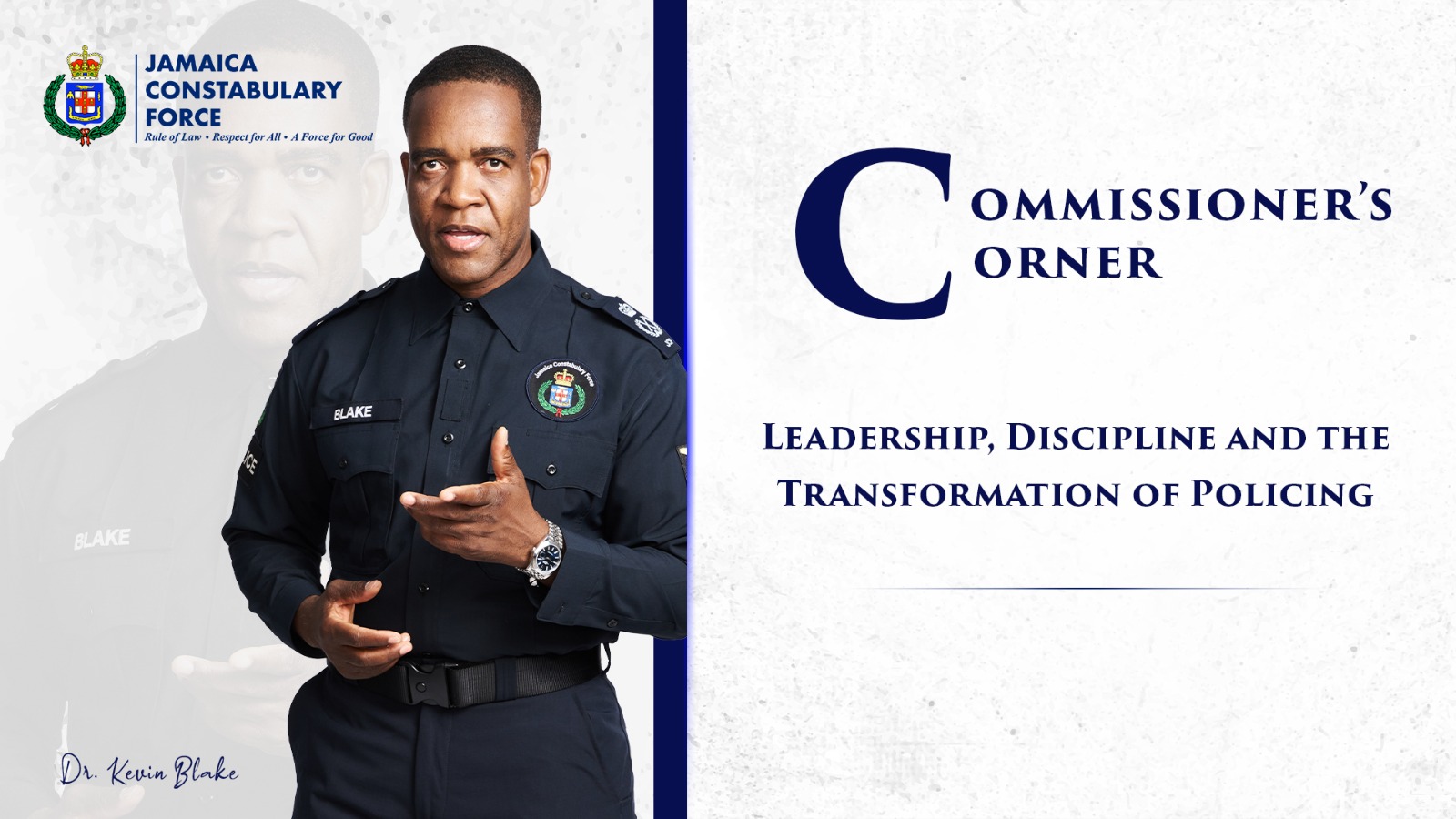
LEADERSHIP, DISCIPLINE AND THE TRANSFORMATION OF POLICING
By any measure, discipline remains the defining pillar of the Jamaica Constabulary Force (JCF). This is not rhetorical framing. It is a legal and organisational reality enshrined in the very Act that governs the Force. Commissioner Dr Kevin Blake, in his most recent column in the weekly Force Orders, reminds us that the JCF is “partially under military organization and discipline.” This foundational principle is not ceremonial but operational. It is the blueprint upon which public trust, legitimacy, and internal cohesion are built.
An important reality that must be appreciated is the fact that discipline is not evenly distributed. The expectations increase with rank, and rightly so. By that reasoning, the Commissioner writes, “the Officer Corps is supposed to be the greatest exemplar of discipline.” Officers do not simply manage resources. They are the custodians of institutional culture. They set the tone. When an officer gives a lawful order, the legitimacy of that order is grounded in the expectation that they themselves are disciplined and principled.
Leadership by example is not aspirational language. It is an operational necessity. Dr Blake notes that, “This relatively small group is responsible for the good order and effective management of the JCF.” In any organisation, especially one armed with legal authority and entrusted with safeguarding life and liberty, order and example must be inseparable. Where they diverge, dysfunction creeps in.
This is why the Commissioner’s insistence on discipline in leadership, particularly in representative bodies, is not punitive but protective. The JCF cannot afford leadership structures that reflect confusion, inconsistency, or self-interest. He quite pointedly says, “Representation must reflect that which is being represented.” If the organisation is built on discipline, then its representation must embody it. Not in part but in full.
The use of mathematical metaphor is telling. The Commissioner likens this to the irrational number π (pi), where even approximations can fall short of representing the full value. The elegance of the analogy belies the seriousness of the point: leadership must be as precise, disciplined, and consistent as the system it claims to serve.
When representation fails, the cost is organisational credibility. The Commissioner is blunt: “When representation falls short of this standard, it weakens the credibility of the group and by extension, the entire organization.” His obligation, he says, is not optional or discretionary. It is a solemn duty. “Ensuring this… is not a favour that I am granting, but rather my solemn responsibility to you and the people of Jamaica.”
There is a critical warning embedded in this argument. Discipline is not a style of leadership. It is the very criteria for holding the position in the first place. “Discipline and good conduct as a requirement to lead any representative body within the JCF is absolutely non-negotiable.” This is as categorical a statement as any public leader could make.
And lest we believe this is merely about internal order, the Commissioner closes with an observation on legacy and accountability. “Those who place self above service, or politics above professionalism, will inevitably face the full weight of accountability.” The JCF is not building an image. It is shaping a legacy. And legacies are built through standards; not slogans.
Discipline in the JCF and – by extension – the wider public sector is not a relic of bureaucratic orthodoxy. It is the organising principle upon which modern, responsive public institutions are built. In the context of public sector transformation, individual discipline reinforces the reliability of roles, while organisational discipline safeguards the integrity of systems. The modernisation of the JCF, like that of any forward-leaning public body, demands systems that are not only efficient but dependable.
If the JCF’s journey through ISO 9001 certification has taught us anything, it has drilled into us that the systems we design to serve the public must deliver promised outcomes in a consistent and timely manner. These systems cannot function without personnel who internalise discipline as both a personal ethic and a professional obligation.
The Commissioner’s insistence on discipline at all levels reflects an awareness that the delivery of guaranteed service standards – whether in citizen security, investigations, or operations – depends on more than technology or reform blueprints. It depends on the cultivation of a culture where expectations are met without excuse and where leadership reflects the standards it requires of others.
This moment in the organisation’s transformation journey demands clarity of purpose and unity of discipline. The JCF’s aspirations for continued ISO9001 certification, public trust, and operational excellence are all anchored in a disciplined core. That core must be defended, especially at the highest levels.
History, Dr Blake reminds us, “will not remember the excuses we made, but the standards we kept … or failed to keep.” That is not a warning. It is simply a call to lead.







